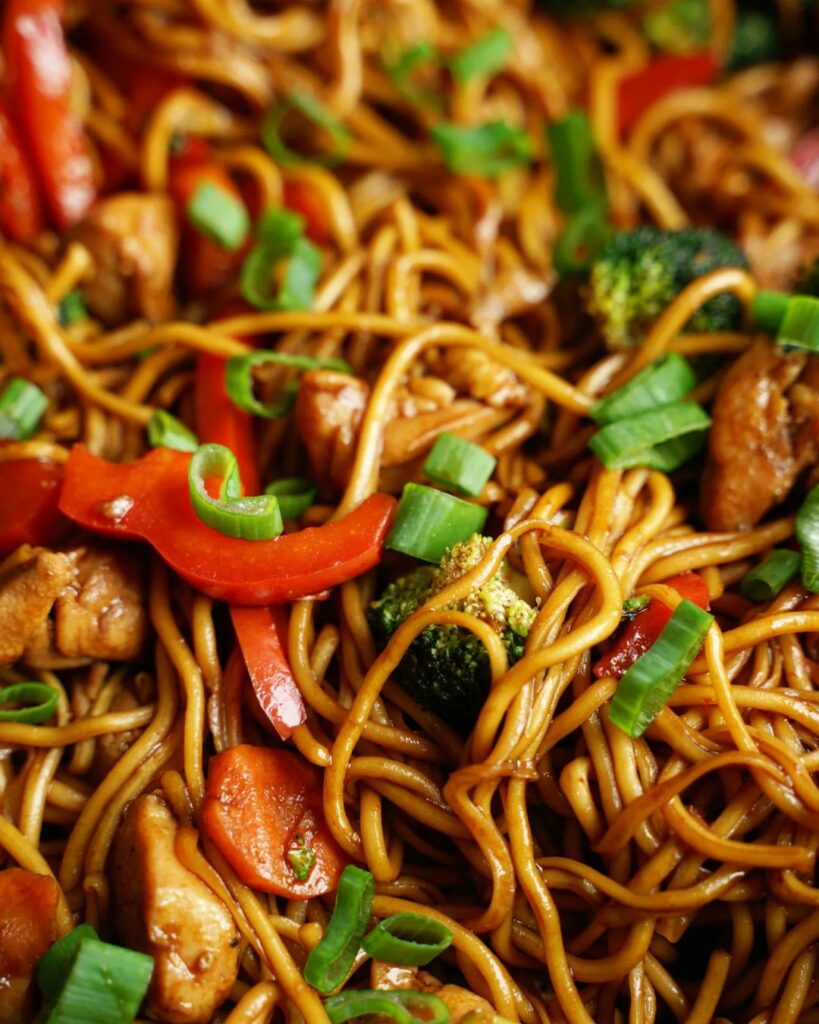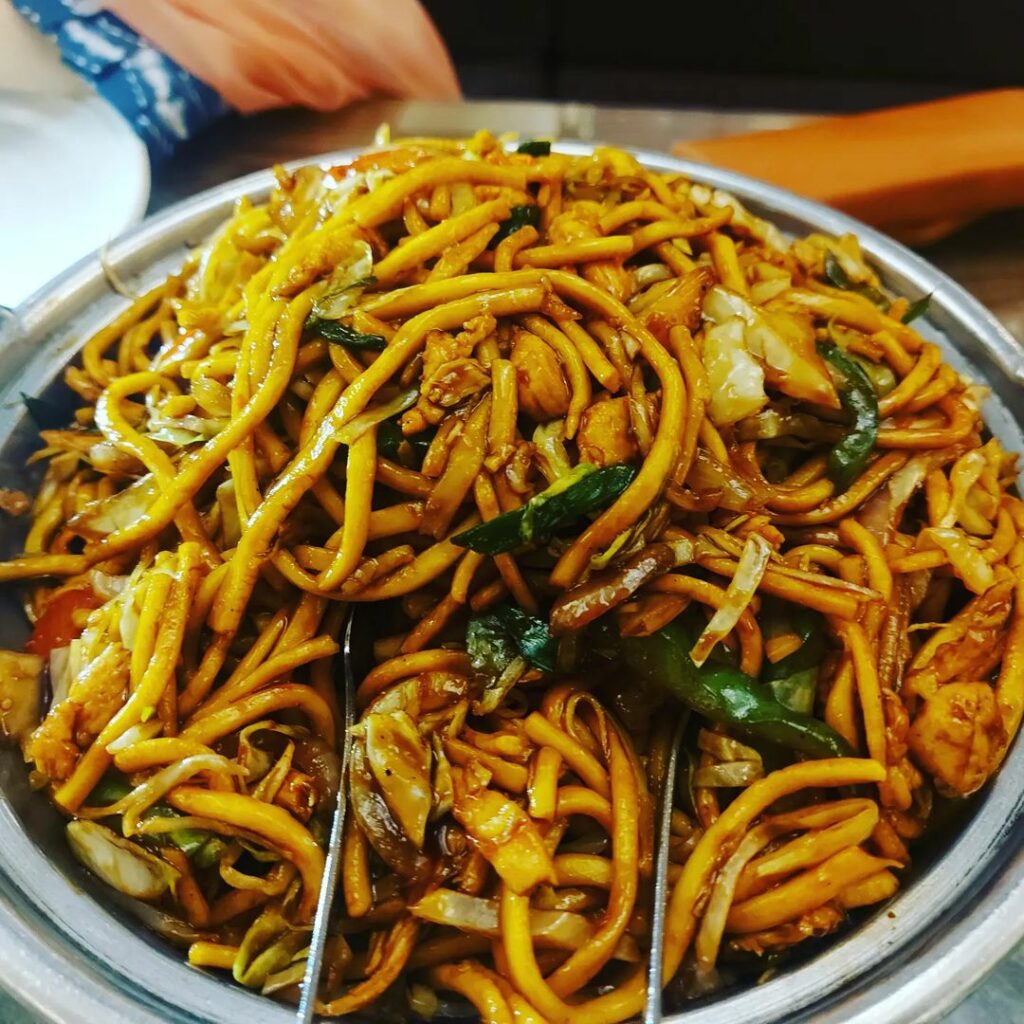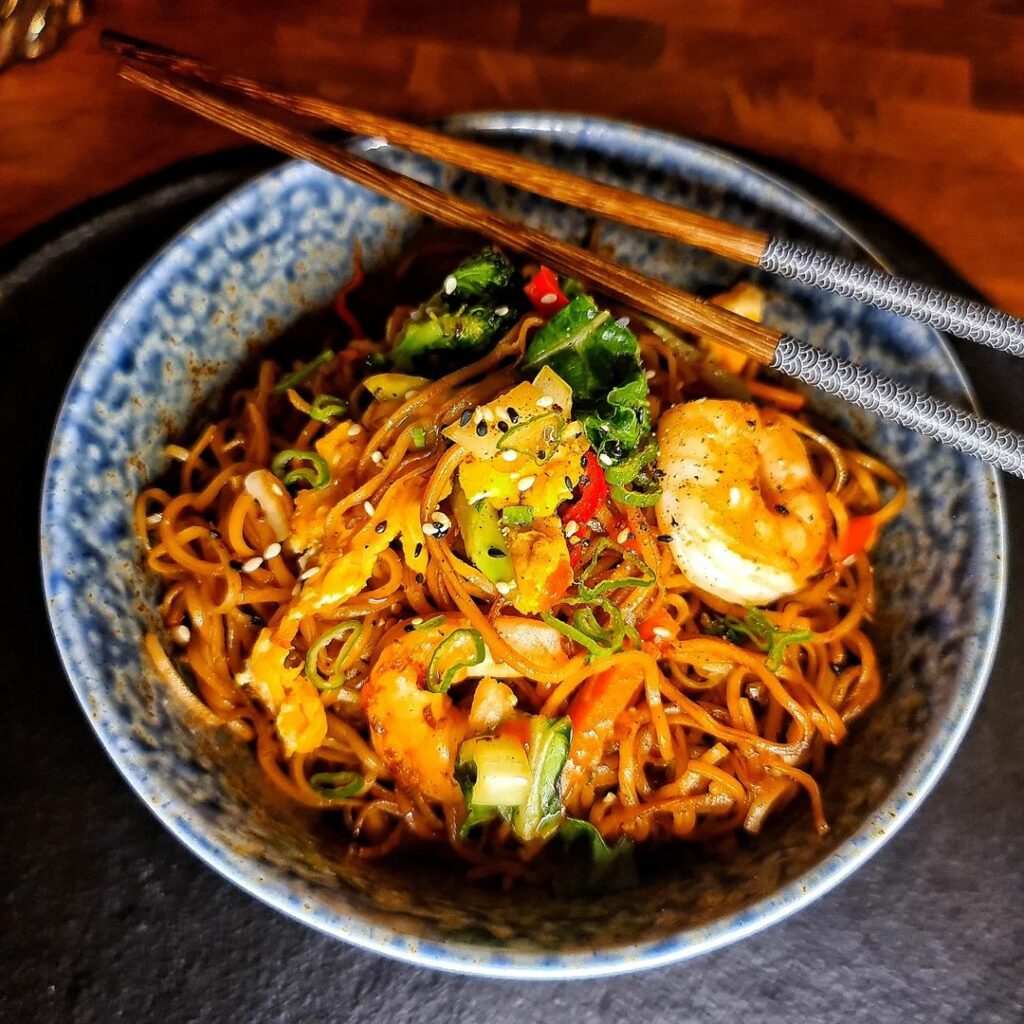Chow mein has gained significant popularity, but is it truly many wonders, “Is chow mein healthy?” This article delves into the health implications of chow mein, highlighting the importance of understanding its nutritional aspects.
By examining its ingredients and exploring its impact on overall well-being, we aim to uncover the truth about whether chow mein is a healthy option. Gain insights into whether chow mein can be a nutritious addition to your diet.
What is chow mein?

Chow mein is a popular Chinese dish that consists of stir-fried noodles. The term “chow mein” translates to “fried noodles” in Cantonese. It originated in the southern regions of China and has evolved over time with various regional adaptations.
There are two main variations: crispy chow mein, where the noodles are fried until crispy, and soft chow mein, where the noodles are boiled and stir-fried. The dish typically includes a combination of vegetables, meat, and sauces, resulting in a flavorful and satisfying meal.
What is a key ingredient of chow mein?
The key ingredients of Cantonese chow mein can vary based on regional and personal preferences, but some common ones include:
- Noodles: Wheat-based, egg-based, or rice-based noodles are commonly used in chow mein.
- Vegetables: Cabbage, carrots, bell peppers, onions, and bean sprouts are often included for their crunch and flavor.
- Protein: Chicken, beef, pork, shrimp, or tofu are frequently added for a source of protein.
- Sauce: Soy sauce, oyster sauce, and various seasonings are used to enhance the taste of chow mein.
- Garlic and Ginger: These aromatic ingredients are often used to add depth to the dish.
Note: The specific ingredients and quantities can vary based on individual recipes and preferences.
Nutrition facts of chow mein
| Nutrient | Amount per Serving (100g) |
| Calories | 280 |
| Total Fat | 10g |
| Saturated Fat | 2g |
| Cholesterol | 30mg |
| Sodium | 750mg |
| Total Carbohydrate | 37g |
| Dietary Fiber | 3g |
| Sugars | 3g |
| Protein | 11g |
| Vitamin A | 10% |
| Vitamin C | 8% |
| Calcium | 2% |
| Iron | 10% |
Is Chow Mein healthy?

Many factors contribute to the overall healthiness of chow mein. By examining the health benefits of its ingredients, such as vegetables, protein, and fiber, we can assess its nutritional value.
Chow mein often includes an array of vegetables that provide essential vitamins, minerals, and dietary fiber. The inclusion of protein sources like chicken, beef, or tofu adds satiety and supports muscle health.
Additionally, the high fiber content aids digestion and promotes a feeling of fullness. When consumed as part of a balanced diet, chow mein can contribute to overall well-being by providing important nutrients and potentially satisfying hunger.
Is chow mein weight loss?
When it comes to weight loss, chow mein can be a consideration, but certain factors should be taken into account:
- Calorie Content: Analyzing the calorie content of chow mein helps in determining its suitability for weight loss. Portion sizes and cooking methods can affect calorie intake.
- Comparison with Other Dishes: Comparing chow mein with other popular dishes can provide insights. It is important to consider the ingredients, cooking methods, and overall nutritional profile when making choices.
- Factors to Consider: When including lo mein or chow mein in a weight loss plan, factors such as portion control, mindful eating, and overall dietary balance play a crucial role.
While chow mein or lo mein can be part of a weight loss plan, it is essential to combine it with regular exercise and an overall healthy lifestyle. Consulting a healthcare professional or a registered dietitian can provide personalized guidance for weight management.
Is chow mein fattening?

The fattening nature of chow mein depends on various factors. Chow mein can be higher in calories and fat if it contains excessive amounts of oil, fried noodles, and fatty meats.
However, chow mein can also be made in a healthier manner by using lean protein sources, plenty of vegetables, and minimizing the use of oils.
Portion control is also essential for managing calorie intake. By making mindful choices and opting for healthier variations, chow mein can be enjoyed without being overly fattening.
Is chow mein healthier than fried rice?
| Chow Mein | Fried Rice | |
| Main Ingredient | Noodles | Rice |
| Texture | Soft or Crispy | Soft |
| Cooking Method | Stir-fried | Stir-fried or Steamed |
| Flavoring | Soy sauce, oyster sauce, or other sauces | Soy sauce, oyster sauce, or other sauces |
| Protein Sources | Chicken, beef, pork, shrimp, tofu, or none | Chicken, beef, pork, shrimp, tofu, or none |
| Vegetable Content | Varied, commonly includes cabbage, carrots, bell peppers, and bean sprouts | Varied, commonly includes peas, carrots, corn, and onions |
| Calorie Content | Varies based on ingredients and portion size | Varies based on ingredients and portion size |
| Fat Content | Varies based on ingredients and cooking methods | Varies based on ingredients and cooking methods |
| Nutritional Profile | Contains carbohydrates, protein, and vegetables | Contains carbohydrates, protein, and vegetables |
| Health Aspects | Can be made with healthier ingredients and cooking methods | Can be made with healthier ingredients and cooking methods |
| Dietary Considerations | Portion sizes and ingredient choices are important for managing calories and fat intake | Portion sizes and ingredient choices are important for managing calories and fat intake |
FAQs
Can I include chow mein in a low-sodium diet?
Including chow mein in a low-sodium diet can be challenging due to the typically high sodium content in sauces and seasonings used.
However, you can make modifications by requesting reduced-sodium sauces or preparing chow mein at home with low-sodium ingredients. It’s important to be mindful of sodium intake and choose options that align with your dietary needs.
Are there healthier alternatives to traditional chow mein?
Yes, there are healthier alternatives to traditional chow mein. Consider choosing variations with whole wheat or brown rice noodles for added fiber.
Additionally, opting for lighter sauces, incorporating more vegetables, and choosing lean protein sources can make your chow mein a healthier option.
Does chow mein contain gluten?
Chow mein can contain gluten depending on the type of noodles used. Traditional chow mein noodles are made from wheat flour and therefore contain gluten.
However, gluten-free alternatives such as rice noodles or gluten-free wheat noodles can be used to make gluten-free chow mein.
Is chow mein suitable for vegetarians?
Chow mein can be suitable for vegetarians depending on the ingredients used. Vegetable chow mein, made with an assortment of vegetables and without any meat or animal-derived ingredients, is a common vegetarian option.
However, it’s always important to check the specific ingredients and cooking methods to ensure that no animal products or meat-based sauces are used in the preparation.
Can chow mein be eaten as a post-workout meal?
Chow mein can be consumed as a post-workout meal, but it’s important to consider portion sizes and the overall macronutrient balance of the meal. While chow mein provides carbohydrates for replenishing glycogen stores, it’s also important to include an adequate amount of protein for muscle recovery.
Adding lean protein sources such as chicken, shrimp, or tofu to the chow mein can help make it a more well-rounded post-workout meal.
Is chow mein a good choice for pregnant women?
Chow mein can be a suitable choice for pregnant women, but certain considerations should be kept in mind. It’s important to ensure that the ingredients are fresh, properly cooked, and free from any potential contaminants.
Pregnant women should also pay attention to the sodium content and choose lower sodium options when possible. Additionally, discussing dietary choices with a healthcare provider or a registered dietitian is recommended to ensure that chow mein and other foods fit well within a healthy and balanced pregnancy diet.
Is chow mein a good source of energy?
Chow mein can provide a moderate amount of energy due to its carbohydrate content. The noodles in chow mein are a source of carbohydrates, which are the body’s primary energy source.
However, the overall energy content can vary based on portion sizes, cooking methods, and specific ingredients used. It’s important to consider the balance of macronutrients and portion control to determine the energy contribution of chow mein in your diet.
Does chow mein contribute to bloating or gas?
Chow mein, like any food, has the potential to cause bloating or gas in some individuals. The specific impact can vary depending on personal tolerance and digestive health. Some people may be more sensitive to certain ingredients or spices commonly used in chow mein, which could contribute to bloating or gas.
If you have known sensitivities or experience discomfort after consuming chow mein, it may be helpful to identify any specific ingredients that could be triggering these symptoms and adjust your diet accordingly.
Can chow mein be enjoyed on a paleo diet?
Chow mein, traditionally made with wheat-based noodles, is not considered paleo-friendly due to the exclusion of grains from the paleo diet. However, there are paleo-friendly alternatives available, such as using vegetable noodles or grain-free noodles made from ingredients like cassava flour or almond flour.
By making these substitutions and using paleo-approved ingredients and seasonings, it is possible to create a version of chow mein that aligns with the principles of a paleo diet.
Is chow mein recommended for individuals with gluten sensitivity?
Chow mein made with traditional wheat-based noodles is not recommended for individuals with gluten sensitivity or celiac disease, as it contains gluten.
However, gluten-free alternatives such as rice noodles or noodles made from gluten-free grains like quinoa or buckwheat can be used to make gluten-free chow mein. It’s important to carefully read labels, ask about ingredients, or prepare gluten-free chow mein at home to ensure it is safe for individuals with gluten sensitivity.
Conclusion
Bluntly stated, when asking, “Is chow mein healthy?” the answer lies in the choices we make. Chow mein can indeed be a healthy option when prepared with nutritious ingredients, mindful cooking methods, and portion control.
The inclusion of vegetables, lean protein, and whole grain noodles can enhance its nutritional value. However, it is essential to be mindful of factors like sauce usage, oil content, and overall balance in one’s diet.
By making informed choices and incorporating chow mein as part of a varied and balanced eating plan, it can be enjoyed as a flavorful and nourishing meal. So, next time you indulge in chow mein, remember that its healthiness is within your control.
Keep reading: